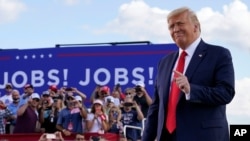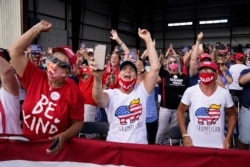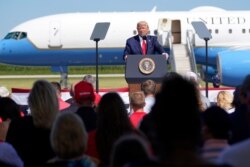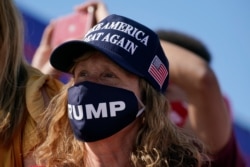On the day the Democratic Party began its virtual convention, the incumbent Republican president, Donald Trump, brought his campaign to the heart of the upper Midwest.
In campaign-style stops at airports in Minnesota and Wisconsin on Monday — replicating the rock music soundtracks of his “Make America Great Again” political rallies — the president, speaking to invited clusters of supporters on the tarmacs, accused his presumptive election opponent of being a clueless puppet of “left-wing fascists.”
A victory by the opposition party in November, Trump warned, would mean open borders, economic collapse and other perceived calamities.
“In Joe Biden's America, the protections of American citizenship will be stripped away, and your community will be left at the mercy of the mob,” the president told the outdoor audience at the airport in Mankato, Minnesota.
Later, during a similar event on the tarmac at the airport in Oshkosh, Wisconsin, Trump said “no one will be a safe in Biden-run America” because the former vice president and his running mate, Senator Kamala Harris, “are pro-crime and anti-cop.”
Trump was competitive in Minnesota in 2016; Hillary Clinton barely won the state.
“It is clear that to the extent that the president has a strategy, it is the old ploy to play up the fears of white middle class beset by protests, riots and changing demography,” Jennifer Delton, a history professor at Skidmore College, told VOA. “The George Floyd protests, the concurrent riots and resulting property damage, and continued calls to ‘defund’ police are all disturbing and uncomfortable realities” for many in Minnesota of the older baby boomer generation, regardless of their political leaning.
Minnesota was, for much of the 20th century, a bastion of the progressive liberal tradition out of which emerged two vice presidents from the Democratic Party: Hubert Humphrey and Walter Mondale. But since the 1980s, that tradition has been challenged by a variety of conservatives.
“At the same time, the state has become incredibly diverse with strong, politically active Hmong and Somali communities,” Delton said.
In addition to the airport visits in Minneapolis and Mankato in Minnesota and Oshkosh in Wisconsin, the president is to go to the southwestern border city of Yuma in Arizona on Tuesday. Two days later, he is scheduled to be near Biden’s boyhood home in the northeastern city of Scranton, Pennsylvania. That will occur the same day Biden makes his presidential nomination acceptance speech from neighboring Delaware.
In his successful 2016 campaign for the White House, Trump reveled in the cheers from sign-waving supporters at large public rallies. But both the Trump and Biden public campaigns have been sharply curtailed this year by the coronavirus pandemic and the need to keep their adherents socially distanced from each other.
The change, which Trump blames on China allowing the coronavirus to escape Wuhan, was lamented by the president Monday.
Because of the risk of spreading the COVID-19 virus, the president said that when candidates give speeches now, “you have to stand two football fields away” from the audience.
Trump attempted to stage an arena-sized rally in Tulsa, Oklahoma, in June, but the crowd that showed up was far short of his campaign’s expectations. One of the prominent attendees, former Republican presidential candidate Herman Cain, who did not wear a mask at the event, later died of COVID-19.
This week’s swing through the four states reflects the new reality of downsized events that are the antithesis of U.S. presidential campaigns of yesteryears.
Trump, who for months has been trailing Biden in national polls, is hoping to limit a further political fall-off generated by the virtual Democratic convention, where party luminaries for four days will extol Biden and pillory Trump’s 3½ years as president, particularly his handling of the pandemic and early-2020 predictions that the virus will disappear.
“The China plague will fade, but we will not forget,” Trump stated in Mankato on Monday.
The United States, with nearly 5.5 million coronavirus cases, also has the most reported COVID-19 deaths of any country –- more than 170,000.
The president prefers to dwell on other matters during his campaign-style events.
On Monday, he spoke about rebuilding the economy a second time after the pandemic hit.
“You know what that is?” Trump asked. “That’s right. That’s God testing me. He said, ‘You know, you did it once.’ And I said, ‘Did I do a great job, God? I’m the only one that could do it.’ He said, ‘That, you shouldn’t say. Now we’re going to have you do it again.’”
Ken Bredemeier contributed to this report.








